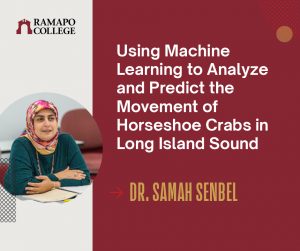- About Ramapo
- Academics
- Admissions & Aid
- Student Life
- Athletics
- Alumni
- Arts & Community
- Quick Links
- Apply
- Visit
- Give
Center for Data, Mathematical, and Computational Sciences
August 27, 2021Using Machine Learning to Analyze and Predict the Movement of Horseshoe Crabs in Long Island Sound

Dr. Samah Senbel, Assistant Professor of Computer Science at Sacred Heart University will be describing her work on developing machine learning models to predict animal movement patterns. Please join us (virtually) on Monday, September 27th at 1pm to learn more about this important area of study in ecology, conservation and wildlife management.
Connection details will be provided after registration.
Abstract: Developing models to predict animal movement patterns is an important area of study in ecology, conservation and wildlife management. Models can be used to decipher patterns in mark-recapture data and machine learning can help to make predictions about future animal movement patterns. Project Limulus (PL), a community research program, has been tracking the movement of tagged individuals in the population of American horseshoe crabs (Limulus polyphemus) in Long Island Sound since 1997. During the spring spawning season, horseshoe crabs are captured by hand in spawning areas along the Connecticut (CT) shoreline, tagged and then released. Recaptured horseshoe crabs give valuable information about their behavior, if they exhibit site fidelity and movement patterns around the Sound. In this paper, we tested various models to find the best predictor for the movement of spawning horseshoe crabs to shorelines in the Sound based on the observed movement activity in previous years. The dataset consists of all the previous horseshoe crab movements: initial longitude and latitude, sex, initial date, and recapture longitude and latitude and recapture date. This dataset has 19,219 recapture records covering twenty years of activity. We experimented with three different models: Linear Regression, Decision Tree, and Random Forest Regression models. We used the data for 2018 as our test set and the data of all previous years as our training set. The Random Forest Regression model proved to be the best predictive model for animal movement and resulted in the smallest RMSE and MAE, as well as the smallest maximum error in prediction. The predicted horseshoe crab locations can be targeted in the next season for recapturing previously tagged horseshoe crabs, which provides valuable information about their movement patterns. It also concentrates the scientists’ effort and time to find the maximum number of horseshoe crabs.
This talk is supported by a grant from the Ramapo College Foundation.
Categories: Data Science, Lecture Series, MSDS
April 21, 2021MSDS Students at Scholars Week - College Football Recruiting Using Machine Learning Techniques
Colette Barca, Keith Osani, Nisha Srishan, and William “Brady” Wulster are inaugural members of the Master’s in Data Science program. During their MATH 570 Applied Statistics course with Professor Osei Tweneboah, they designed and completed a research project to predict high school football recruits’ college commitments using several Machine Learning techniques.
The four designed their project with the understanding that college football is big business. To create a winning team that will continue to generate revenue, Division I Football Bowl Subdivision (FBS) Power Five schools need to choose their recruits wisely. Recruits are selected
based on certain player attributes. Power Five schools are the most frequented schools by NFL scouts, making these schools highly desired by recruits. In this regard, Barca, Osani, Srishan, and Wulster built a model to predict whether a high school recruit will commit to a school in one of the Power Five Conferences. Such a model could allow a school to optimize its recruiting process, maximizing its return on investment. They used their dataset to fit several Machine Learning models. After completing the project, it was determined the Random Forest model produced the most accurate results. This model also revealed which particular attributes are indisputably the most important predictors of commitment to a Power Five school. This final model has the potential to be successfully used to improve the recruiting process.
Categories: Data Science, MSDS
April 25, 2020MSDS Fall course delivery options related to COVID-19
With uncertainty surrounding the upcoming Fall semester due to the COVID-19 pandemic, we want you to know our contingency plans in case of disruption.
All MSDS courses for the Fall 2020 semester are scheduled to be delivered as hybrid courses. This means a large portion of course content will be delivered online, however the course will meet once a week on campus. We’ve scheduled all three MSDS courses to meet on Thursday evenings.
There are two scenarios that could alter these plans:
- Ramapo College converts the Fall 2020 semester to online-only / remote delivery. In the unlikely event this happens, our hybrid format is well suited to move to 100% online, and our faculty have ample experience with this format. While we’d prefer to have the on-campus component, we will be well prepared and will still have a successful semester.
- Ramapo College holds on-campus courses as normal, however you, personally, are unable to be on campus. This could be because you are in a high risk category for COVID-19 and prefer not to attend in-person classes. This could also happen if you have difficulty obtaining a student visa to enter the United States due to delays related to the pandemic. In anticipation of these situations, we are committed to allowing students to attend the on-campus meetings virtually, through live stream or recording.
As we move through the summer and details of the Fall become more clear, we will provide additional details about remote delivery options.
Please stay safe, and we very much hope to see you in the Fall!
Categories: Data Science
February 10, 2020Ramapo adds new Mathematics faculty to support Data Science
Ramapo College is excited to welcome Matthew Jobrack to our Mathematics faculty.
Matthew Jobrack holds a B.S. in mathematics from Longwood University with a concentration in secondary education, a M.A. in mathematics from Appalachian State University, and a M.S in Statistics from Washington State University. He is currently a doctoral candidate in mathematics at Washington State University specializing in analytic number theory, with additional research interests in statistical wildlife population models. He has coauthored peer-reviewed publications in both mathematics and math education. He currently lives with his wife, daughter, 2 cats and 1 dog.
Categories: Data Science
January 13, 2020Ramapo welcomes new Data Science faculty member
Ramapo College is excited to welcome new Data Science faculty member Dr. Debbie Yuster. Dr. Yuster holds a B.A. in Mathematics with a concentration in Computer Science from Cornell, and a Ph.D. in Mathematics from Columbia, specializing in the field of Combinatorics.
Dr. Yuster joins us from SUNY Maritime College, where she has been a math professor for over a decade, earning accolades such as the SUNY Chancellor’s Award for Excellence in Teaching. Dr. Yuster served as a Visiting Data Science Scholar at the Wall Street Journal, and has cultivated industry partnerships leading to student research projects. She has authored peer-reviewed journal publications in mathematics, and has given numerous invited lectures. Dr. Yuster is also interested in K-12 STEM outreach, having worked with secondary school math teachers and students for many years. As part of Ramapo’s Data Science program, Dr. Yuster will teach courses in Data Science, Mathematics, and Computer Science.
Categories: Data Science
December 10, 2019Ramapo welcomes first new Data Science faculty member
Ramapo College is excited to welcome our first new Data Science faculty member, Osei Tweneboah. Osei is a Ph.D. Candidate in the Computational Science Program at the University of Texas at El Paso (UTEP) and will be joining Ramapo this coming Fall – where he will be teaching courses in Python and Applied Statistics.
Osei’s research interests include data science and stochastic analysis with applications to big data analytics and complex data sets arising in finance, health care, geophysics etc. Osei has co-authored fourteen (14) peer reviewed papers in the areas of statistics and data science, applied mathematics and computational science. His most recent work involves applying mathematical modeling processes originally applied to financial data to predicting natural phenomenon – such as earthquakes.
Categories: Data Science
November 20, 2019Data Science at ESPN: NBA player performance

Join us on December 5th to hear Brian Macdonald showcase how Data Science identifies the value of box score statistics in estimating NBA players’ contribution to on-court performance. Dr. Macdonald is the Director of Sports Analytics at ESPN, and has a doctorate in Mathematics from Johns Hopkins University.
Please join us in the York Room (Mansion) on December 5th at 4pm to hear about how these approaches can be applied to a variety of sports such as hockey, soccer, football, and eSports.
You’ll also have the opportunity to learn more about Ramapo’s new Data Science programs, launching this coming fall.
Categories: Data Science, Lecture Series
Copyright ©2025 Ramapo College Of New Jersey. Statements And Policies. Contact Webmaster.
